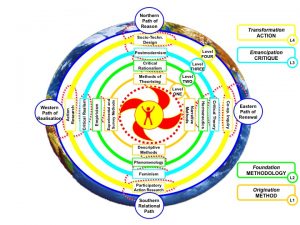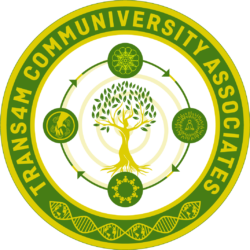- Home
- Integral Research Theory
Starting Point: Our Frustration with Social Science Research
It has been our longstanding passion to conceive of learning and research in a transformational way. Learning should not primarily be geared toward recipients gaining factual knowledge, but should rather be liberating and transformational, for the individual and, by extension, for their societies. Equally research should not merely lead to yet another all too often irrelevant publication on the library shelf, but should indeed go all the way from theory to action, with the final objective being that of leading to transformation on the ground. In other words, social science research-and-innovation should generate relevant knowledge to address issues that truly matter in particular social and economic contexts.
Unfortunately, most of social science research that is produced today does not function that way. It is all too exclusively ‘northern’, rather than the ‘North’ and ‘West’ building on the ‘South’ and ‘East’. The fact that much of it does not lead to social innovation is an important reason for the multitude of severe social problems we are facing today – from an increasing lack of communal cohesion, to inefficient means of conflict resolution, from inappropriate education systems to dysfunctional economic and financial systems. The list is endless. Designing integrally oriented Masters and Doctoral Programs ourselves – always drawing on participants’ burning social issues within their contexts – we started to explore in more depth the underlying reasons for the predicament of today’s social science research. During this exploration we received three wake-up-calls, that we then responded to with the development of Integral Research – as a contribution to heal this predicament, so to say.
Towards a new Integral Research Paradigm: Three Wake-Up Calls
The more we wandered through the all too often desert-like landscapes of social science research, the more we saw emergent pictures of the promised land. It was the following three insights that gave us clues for the renewal of the existing research paradigm:
First Wake-Up Call = Social Science Research can lead to Social Innovation: We noticed increasingly that the majority of social researchers are totally oblivious to the rich and diverse portfolio of research methods. Instead, most social science research employs ‘western’ (read: American) case studies and survey methods, the latter characteristically using questionnaires and interviews. That’s it. These represent, however, only a limited number of research methods, reflecting in particular a pragmatic-experimental and rational-theorising approach to knowledge generation. What we saw as left out were all those more humanistically-descriptive and interpretively-narrative oriented research methods that could accommodate cultural regions where the predominant way of thinking is different to the western way. Employing exclusively ‘western’ methods almost invariably leads to a stifling lack of originality in research. In Europe and America, we noticed the difficulty students often have to methodologically reach out to other parts of the world and their worldviews; this is a core reason of the reasons for a continuous reinforcement of a one-sided way of knowledge generation.We concluded that a new approach to social science research would have to expose the researcher to culturally appropriate and relevant ways of doing research.
Second Wake-Up Call = We need to overcome our Blurred Perspective on Research Method and Research Methodology: We noticed that much of the literature on social science research confuses research method with research methodology. This phenomenon we witness over and over again also among researchers. While the term ‘research method’ points towards research techniques (like, e.g., experiment, survey, grounded theory), the term ‘research methodology’ points towards profound philosophical perspectives (like, e.g. Empiricism, Feminism, Phenomenology, Hermeneutics, Post-Modernism, Critical Rationalism). In other words, research methodology is all about challenging, evolving, and even revolutionising our view of the world and of our understanding of knowledge and its creation.
Each research methodology then represents an entirely different worldview, and seeing the diversity of these methodologies – or indeed paradigms or philosophies – helps us as researchers to position our own worldview while at the same time not neglecting all other perspectives. Research methodologies, however, are rarely seen in this revolutionary light, and furthermore, they are not purposefully connected with research method, thereby interlinking the more philosophical worldview with a concrete technique to enact the research. We also became aware that whereas Europeans have conceived of most research methodologies, most research methods come from the USA. In a nutshell, philosophy comes from Europe, while pragmatic translation of research comes from the US. The rest of the world has been left out, which leads, again, to a perpetuation of American-European perspectives, and inhibits other perspectives from participating. This is a matter of enormous importance, as the research methodologies and methods that are employed have become a powerful, but almost hidden, vehicle for the cementation of basically a combined European-American worldview. As we explained earlier, any domination is ultimately to the detriment of the dominator as well. A lack of diversity always kills the resilience of a social system and its capacity to adapt. A new integral research paradigm would have to not only integrate research method and research methodology in a new way, it would also have to allow the integral researcher to chose more freely from combinations of research methods and methodologies that the whole world has to offer.
Third Wake-Up Call = Research Needs Integration: The third agonising fact that we encountered in social science research is the rift between theory and action. In other words, not only does much of social science research never see the light of active day, but there is also a strong division between highly theoretically oriented social researchers, who are familiar with the depth of research methodologies but are often out of touch with concrete realities on the ground, and those social science researchers who work in more applied ways, but are out of touch with the philosophical roots of their research field. While the former fall short by not having any impact on the ground, the latter fail in contributing to a more radical revision of the underlying philosophy and worldview, which is so important for our time today.
Integral Research: A newly emergent Research Paradigm
Having received the three wake-up calls and having started to understand the inherent dilemmas in social science research in more depth, we gradually began to develop our approach to Integral Research and Innovation. Addressing all of those dilemmas, Integral Research allows the researcher to choose between four (or a combination of two or more) research paths that jointly fulfil the following criteria:
- Integral Research paths reflect different modes of thinking and being (if not from all over the world, at least from all over Europe as well as America).
- Integral Research paths are culturally rooted and relevant to the specific context to which they are applied.
- Integral Research paths interconnect research method and methodology, action and research, thereby stretching over the full trajectory: leading from a burning social issue to transformative action on the ground.
In addition, what became a real discovery for us is that research method would now serve as a starting point and not at an end point of research. We see it as an access point to the research issue and context. That ensures that the research is from the very beginning practically and experientially rooted in a burning social issue on the ground.
Working with Integral Research
Let us have a look at the following Figure through which we provide a summary overview of the Integral Research realms (‘southern’, ‘eastern’, ‘northern’ and ‘western’ paths) and rhythms (four trajectories with Levels 1,2,3,4) that we distinguish within each research path:

According to Integral Research the researcher begins in the centre of the model by reflecting on his or her own personality, his or her burning research issue and desire, specific research context, cultural background, and personal research style. S/he then chooses a research path or even a combination of two or more paths.
Then the research is firstly grounded in a research method (Level 1) where the researcher gets really in touch with his or her issue, desire and context. Thereafter the integral researcher gradually builds up a theoretical foundation by applying Level 2 of the research path. On Level 2 he or she lays the foundation for new theory, primarily by working through one of the classical research methodologies, such as Phenomenology, Hermeneutics, Critical Rationalism and Empiricism. This, however, is only a foundation, which then on Level 3 is to be radically challenged, by surfacing the shortcomings of the existing theory base. On this level the researcher works with one of the so-called emancipatory methodologies – such as Feminism, Critical Theory, Post-Modernism, or Critical Realism. The radical critique is not merely an intellectual exercise, but is then to be tested in practice through the application of Action Research on Level 4. On Level 4 we distinguish four different types of Action Research methodologies: Participatory Action Research, Cooperative Inquiry, Socio-Technical Design and the western original form for Action Research.
In conclusion, we start with an active engagement with the context (through applying research method on Level 1) and we end – having built a strong theory basis and developed a radical critique to its shortcomings – with Action Research (Level 4) that leads to transformative results on the ground within the given research context.
Note: Impressive Application of Integral Research Worldwide
By now quite a number of our masters and doctoral students have applied Integral Research in theory and practice. Bethel University in St. Paul in the USA has even made Integral Research a requirement for many of their doctoral classes. Among the most encouraging results was the research of our Zimbabwean Masters (and now Doctoral) students whose masters research led effectively to a sustainable project that delivered food security for over 100.000 people in rural Zimbabwe. Their research was firmly lodged within communal grounds and within Zimbabwe’s cultural and societal context. An excellent piece of Integral Research is also embodied in the work of Sam Rima. His research led him to the development of a theory on Spiritual Capital. A compelling example from the Middle East is that of Maqbouleh Hammoudeh, who developed through Integral Research a theory on Islamic Management that she is now putting into practice in collaboration with her clients through her consulting work in Jordan and the Middle East.
Note: Integral Research is also the guiding research framework of our international PhD program on Integral Development
Note: This summary is based on Lessem, R. & Schieffer, A. (2010) Integral Research and Innovation: Transforming Enterprise and Society

